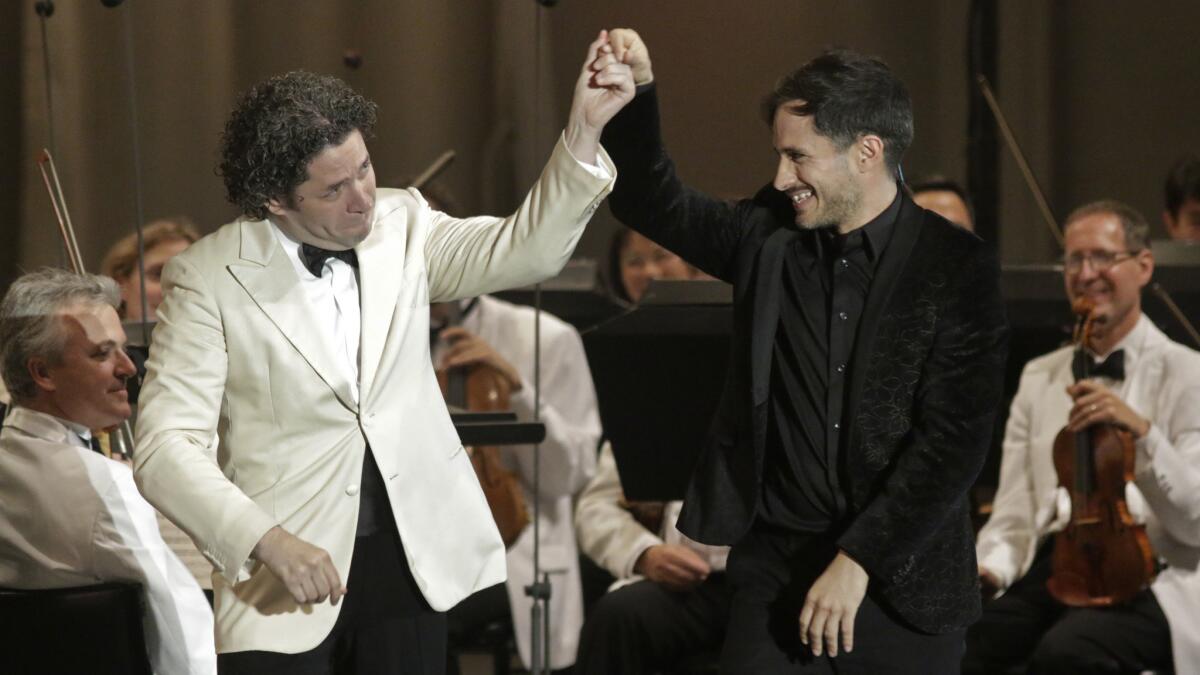Review: L.A. Phil, Dudamel dive into the ‘Mozart in the Jungle’ act at the Bowl

Gustavo Dudamel, left, gives a nod to Gael García Bernal after the actor’s “guest conducting” in a performance at the Bowl.
- Share via
It’s a jungle out there.
That thought must be in the minds of performers making their debut with the Los Angeles Philharmonic at the Hollywood Bowl as they walk on stage and look out upon the huge amphitheater. There is very little rehearsal; a morning run-through is typical. High-definition video and audacious amplification expose every blemish or missed note. Even worse, the Bowl is used by the L.A. Phil as a venue for trying out new talent.
The two performers new to the L.A. Phil on Thursday night for an all-Mozart program conducted by Gustavo Dudamel were naturals. One was Alice Sara Ott, a young German-Japanese pianist. She didn’t so much play Mozart’s Piano Concerto No. 21, one of the composer’s best-known pieces, as inhabit it. The crowd loved her, and the orchestra players looked like they had already bonded with her.
SIGN UP for the free Essential Arts & Culture newsletter >>
For Rodrigo De Souza, however, Mozart at the Bowl really was “Mozart in the Jungle.” The flamboyant young Mexican conductor, who has just finished his stellar first season as music director of the New York Symphony, led the overture to “The Marriage of Figaro.” The audience was charmed by his antics. The L.A. Phil was all smiles after the performance. Who cared whether he could actually conduct?
In case you’ve missed it, the New York Symphony is the fictional orchestra in the television series “Mozart in the Jungle.” Patterned after the L.A. Phil, it is led by a Dudamel-like Rodrigo, played by the actor Gael García Bernal. The “Figaro” overture was being filmed live for the opening episode of the series’ second season on Amazon. Apparently, the New York Symphony goes on strike, and Rodrigo comes out west.
Whether you are a fan of the satirical series hardly mattered. Bernal’s appearance was an affectionately humorous moment to go down in Bowl lore. The performance was preceded by a video of Dudamel coaching the actor, and it ended with Dudamel coming out and hugging Bernal.
As far as his conducting goes, Bernal more or less followed the orchestra, which appeared to be following concertmaster Martin Chalifour. Few players dared glance at Bernal when he hilariously hammed it up lest they break out laughing. But, thanks to this outing, Rodrigo is not likely to look quite so silly on the podium this fall.
The timing, moreover, couldn’t have been more amusing. The hard-as-nails New York Philharmonic, which the “Jungle” producers may have found too uptight to mimic, has fled its own urban jungle for sunny Southern California, with a short residence at the Music Academy of the West in Santa Barbara.
What made this an occasion to remember, however, was a rare sense of Mozartean conviviality and humor all evening that is impossible to fake. Yet behind the program — which began with “Eine Kleine Nachtmusik” and concluded with a set of arias and duets sung by soprano Miah Persson and bass-baritone Gerald Finley — was a search for garden-freshness in some of Mozart’s most overplayed music.
Dudamel added unusual oomph to “Eine Kleine Nachtmusik” (A Little Night Music), rummaging for hidden surprises in a familiar landscape the way some hunt for mushrooms. In the concerto, Dudamel then stood out of Ott’s way, letting her do the hunting.
A slight, graceful woman, she drew the video operators as much to her facial expressions as she did to her powerful hands. She could seem lost in a dream but could just as easily reveal a tough side. She brought out the operatic quality in the concerto. When she handed off a phrase to the oboe, the piano wooed the woodwind like a character onstage.
Her tone is clear and strong. In the slow movement Ott treated melodic phrases with the sensitivity of a poet awaiting a reader to find the meaning of a stanza. She added a sense of modernism with burly 20th century cadenzas by Ferruccio Busoni. Her dazzling encore was Liszt’s “La Campanella.” Ott is also of our time. Her latest CD is an arrestingly lush ambient/electronic updating of Chopin with the Icelandic pianist and producer Ólafur Arnalds.
In the arias and duets, Finley and Persson (who were also making their Bowl debuts, but both have a history with the L.A. Phil) proved funny or moving, as needed. The “Papagena, Papageno” duet from “The Magic Flute,” with the singers coming together from the far edges of the stage, was jubilant.
Jubilant, too, was a Mozart “Sleighride” dance that Dudamel threw in at the end. The violas don’t play in it, so principal violist Carrie Dennis brought out a large glass of cold beer and sat back to enjoy the break. Seeing it, Dudamel insisted on a sip, and before giving the upbeat, turned to the crowd to say that no one would take this job away from him.
Earlier, Bernal had warned Dudamel to look out; having had a taste of real conducting, he may next come after Dudamel’s position. In fact, the L.A. Phil made out just fine on this deal. Not only did it attract a sizable crowd of 12,456 to the Bowl, but it got paid by Amazon for its services. And Dudamel was given what many a nervous conductor has undoubtedly longed for on the Bowl podium — a beer.
Twitter: @markswed
More to Read
The biggest entertainment stories
Get our big stories about Hollywood, film, television, music, arts, culture and more right in your inbox as soon as they publish.
You may occasionally receive promotional content from the Los Angeles Times.











